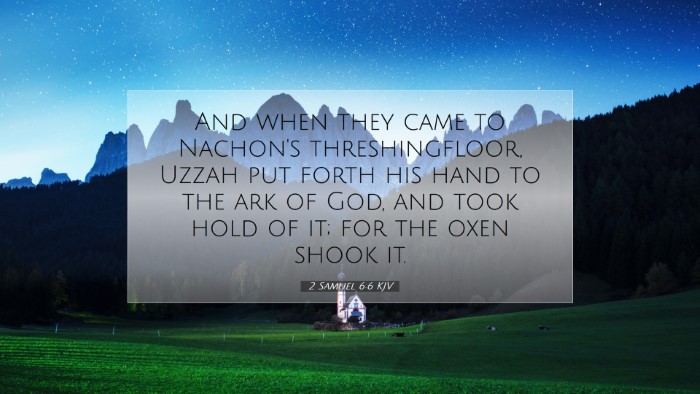Commentary on 2 Samuel 6:6
Verse: "And when they came to Nachon's threshingfloor, Uzzah put forth his hand to the ark of God, and took hold of it; for the oxen shook it."
Contextual Overview
The narrative of 2 Samuel 6 revolves around King David's effort to bring the Ark of the Covenant to Jerusalem, marking a significant moment in the history of Israel. This endeavor reflects David's desire to centralize worship and his acknowledgment of the Ark as symbolic of God's presence with His people. The events leading to Uzzah's action, however, serve as a solemn reminder of the reverence demanded by the holiness of God.
Insights from Public Domain Commentaries
Matthew Henry's Commentary
Matthew Henry emphasizes the seriousness with which God’s holiness should be approached. He notes that Uzzah's intent may have been honorable—seeking to prevent the Ark from falling—but it displayed a lack of understanding of the sacredness of the Ark as God's dwelling place. Henry comments, "Uzzah's action was in direct violation of God’s law, which prescribed that no one but the Levites were to handle the Ark." Such disobedience elicited God’s swift judgment, illustrating the principle that God's expectations for holiness must not be taken lightly.
Albert Barnes' Notes
Albert Barnes expands upon the gravity of Uzzah’s transgression by arguing that the Ark was meant to be carried with great care, indicating the divine specifications outlined in the laws given to Moses. He writes, "God's command was clear regarding the transport of the Ark, emphasizing that it was to be handled only by designated individuals." Barnes suggests that Uzzah’s presumption leads to a significant theological understanding about how humanity approaches the divine and the danger of casualness in sacred matters.
Adam Clarke’s Commentary
Adam Clarke highlights the cultural and situational aspects around Nachon’s threshing floor, steering focus on the social dynamics present when David was bringing the Ark to Jerusalem. Clarke states, "Uzzah’s tragic error lay not only in handling the Ark but also in the circumstances that surrounded its transport—indicating a deeper issue with the overall approach to God's presence." He further explores the idea that missteps in worship and reverence can lead to grave consequences, reminding readers of the necessity of approaching God with humility and fear.
Theological Reflections
This passage invites a comprehensive exploration of several key themes:
- The Holiness of God: The immediate consequence of Uzzah's action signifies that God's holiness is paramount and cannot be treated with disregard.
- Disobedience and its Consequences: Just as Uzzah faced judgment for his disobedience, it serves as a reminder to believers today of the seriousness of adhering to God's commands.
- Intent vs. Action: The distinction between Uzzah’s intention and the action itself highlights how sincerity does not absolve one from responsibility before God's law.
- Worship Structure: This incident delineates the idea that God establishes order in worship, and deviating from it can have severe repercussions.
Practical Applications
For pastors, students, and theologians, the lesson of Uzzah provides rich ground for reflection:
- Reverence in Worship: How can modern worship practices reflect the holiness of God and maintain a sense of awe?
- Understanding God's Commands: In what ways can we ensure that our understanding of scripture and worship practices align with the heart of God's intentions?
- Encouraging Fear of the Lord: How can church leaders instill a healthy fear of God that respects His holiness while also embracing His love and grace?
- Navigating Intentions: How can one discern between sincere intentions and actions that may be contrary to God’s will?
Conclusion
The narrative of Uzzah's consequence serves as a sobering reminder of the need for reverence and obedience in our interactions with God. With historical insights and theological reflection, believers are encouraged to approach divine matters with utmost respect, understanding that God’s holiness is not to be taken lightly.


